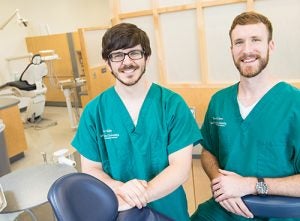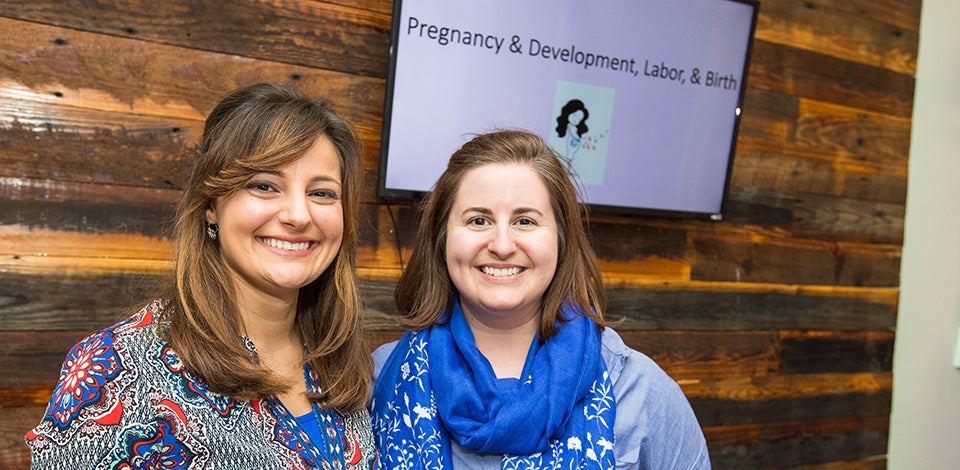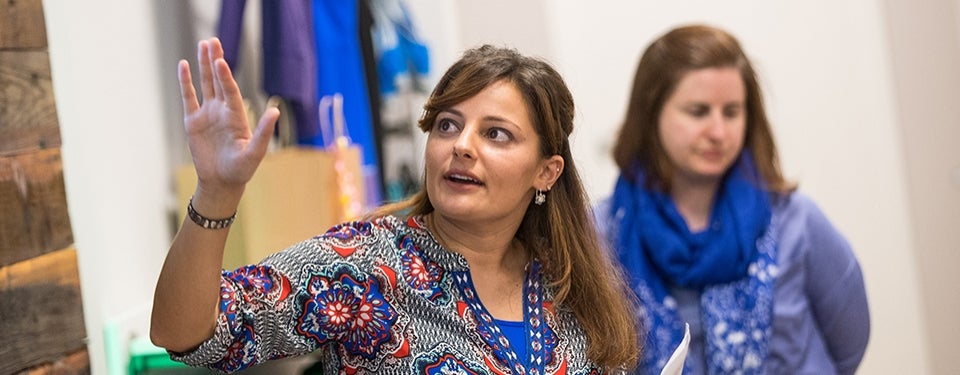CHANGE AGENTS
Schweitzer Fellows serve others, gain leadership skills
Ten East Carolina University graduate students will spend the next year making health care more accessible to populations that are often overlooked.
The students — five from the Brody School of Medicine and five from the School of Dental Medicine — have been named North Carolina Albert Schweitzer Fellows for the 2017-2018 academic year. They represent nearly half of this year’s Schweitzer class, which comprises 23 students from ECU, Duke University, Wake Forest University, North Carolina Central University and the University of North Carolina Chapel Hill.
The fellows will partner with community-based organizations to implement service projects that address health disparities. At the same time, they will undergo leadership development training so they can inspire the next generation of health care professionals to improve the well-being of those who experience barriers to care.
“Many of our fellows go on to build impressive professional careers. The process of moving their fellowship projects from an initial concept to completion teaches them valuable skills in working with others in allied fields,” said Dr. Bruce Auerbach, chair of the Albert Schweitzer Fellowship Board of Directors. “As Schweitzer Fellows develop professionally, this skill is critical to their ability to effect larger-scale change among vulnerable populations.”
Free prenatal and postpartum education
For their Schweitzer project, first-year Brody School of Medicine students Reena Patel and Rebecca Jones are leveraging 12 collective years of nursing experience to provide no-cost prenatal and postpartum education to low-income mothers in Pitt County.
Patel, who worked as a labor and delivery nurse at WakeMed, and Jones, who spent time as a neonatal intensive care nurse at Duke University Hospital, will teach a five-week series to expectant and new mothers. The pair said there is currently no free comprehensive course that is this easily accessible in the area, which lags far behind the rest of the state in terms of newborn health.
“The infant mortality rate here is shocking,” Jones said, pointing to statistics from the N.C. Department of Health and Human Services that show the infant mortality rate in Pitt County has ranged from 28 percent to 60 percent higher than the state average every year since 2011.
“We thought we had a unique opportunity with our backgrounds to make an impact,” Jones added.
The classes will cover labor and delivery, birth and the immediate postpartum period, newborn care and safety, and infant CPR. Recognizing that transportation can be a challenge for low-income mothers, the fellows are offering gas cards and free baby clothing to incentivize attendance. They are working with other area organizations such as Pitt County Public Libraries to provide additional prenatal and postpartum training to new mothers as well.
“If we can empower women to take care of their own bodies and take care of their babies through education, that can only help,” Patel said.
The classes take place at the Brody School of Medicine on Tuesdays, Wednesdays and Thursdays from 6 p.m. to 7:30 p.m. For information or to register, click here or call 919-602-0346.
Dental treatment and long-term primary care for the homeless
Third-year dental student Kiersten Bethea and first-year medical student Samantha Forlenza are teaming up to provide no-cost dental treatment and primary care for homeless patients.
They are establishing a clinic — based in Ross Hall and supported by the School of Dental Medicine — where dental students will treat patients’ emergency oral health needs. With their dental needs met, patients will then see medical students who will administer an HIV test and perform medical screenings to check basic measures of wellness such as heart rate, blood pressure and blood glucose.
Next, School of Social Work students will conduct depression screenings and connect patients with additional resources such as a food bank or counseling services. The students will refer patients to dental and primary care providers who can provide comprehensive, ongoing care.
“A lot of these patients have never seen a dentist in their life or haven’t had a cleaning in years,” Forlenza said. “Being able to access all of these services at the same time is crucial for this population.”
Forlenza and Bethea plan to launch their clinic in August with the goal of serving at least 75 patients by spring 2018.
Healthy teeth for elementary students
Second-year dental students Kevin Holley and Trevor Staton are picking up where an earlier Schweitzer project left off. In 2014-2015, two dental students worked with the Greene Access Program (GAP), part of Greene County Health Care, to deliver oral health lessons to over 1,200 elementary school children in Greene County. The fellows helped enroll the children in GAP clinical services, where they received preventative care such as dental sealants to reduce tooth decay.

Dental students and Schweitzer fellows Kevin Holley, left, and Trevor Staton will deliver oral health education to elementary students in Pitt County.
Holley and Staton hope to expand GAP enrollment within selected Pitt County schools. Using public health data, Greene County Health Care has identified six schools in Pitt County with a high proportion of at-risk elementary students in need of dental services, both preventative and restorative.
An important part of the project is to engage school administrators and parents, after which the dental students hope to present oral health lessons in classrooms, enroll children in the dental sealant program, and assist in a referral program to help children and families establish dental homes.
“Our project aims to address the lack of oral health services for many elementary school students in Pitt County by offering classroom instruction as well as free dental screenings and sealants through partnership with the local federally-qualified health-care center known as Greene County Health Care,” Holley explained.
“Coming from an underserved part of the state, I feel that this project can provide me with good experience and knowledge that I can one day take back to my hometown,” said Staton, a native of Hayesville.
Additional ECU 2017-2018 Schweitzer Fellows are dental medicine students Allen Bunch and Morgan Stroud, who will link pediatric patients to a dental home at the School of Dental Medicine, and medical students Katherine Mulligan and Yasamin Sanii, who are developing a project to help patients with chronic disease receive better continuity of care.
Addressing unmet health needs — for life
Since 1994, the North Carolina Albert Schweitzer Fellowship Program has supported 425 fellows from many academic disciplines through funding from various foundations, academic institutions and individual donors. This year’s 23 North Carolina fellows join approximately 240 others nationwide.
Fellows all work with mentors at one of 14 program sites across the U.S. and in Lambaréné, Africa, where physician-humanitarian Dr. Albert Schweitzer founded a hospital in 1913. Upon completion of their fellowship year, awardees become Schweitzer Fellows for Life and join a vibrant network of more than 3,400 Schweitzer alumni nationwide who are skilled in – and committed to – improving the health and well-being of underserved people throughout their careers.

Medical students Reena Patel, left, and Rebecca Jones plan to work with a variety of organizations to offer no-cost prenatal and post-partum education to mothers in Pitt County.
